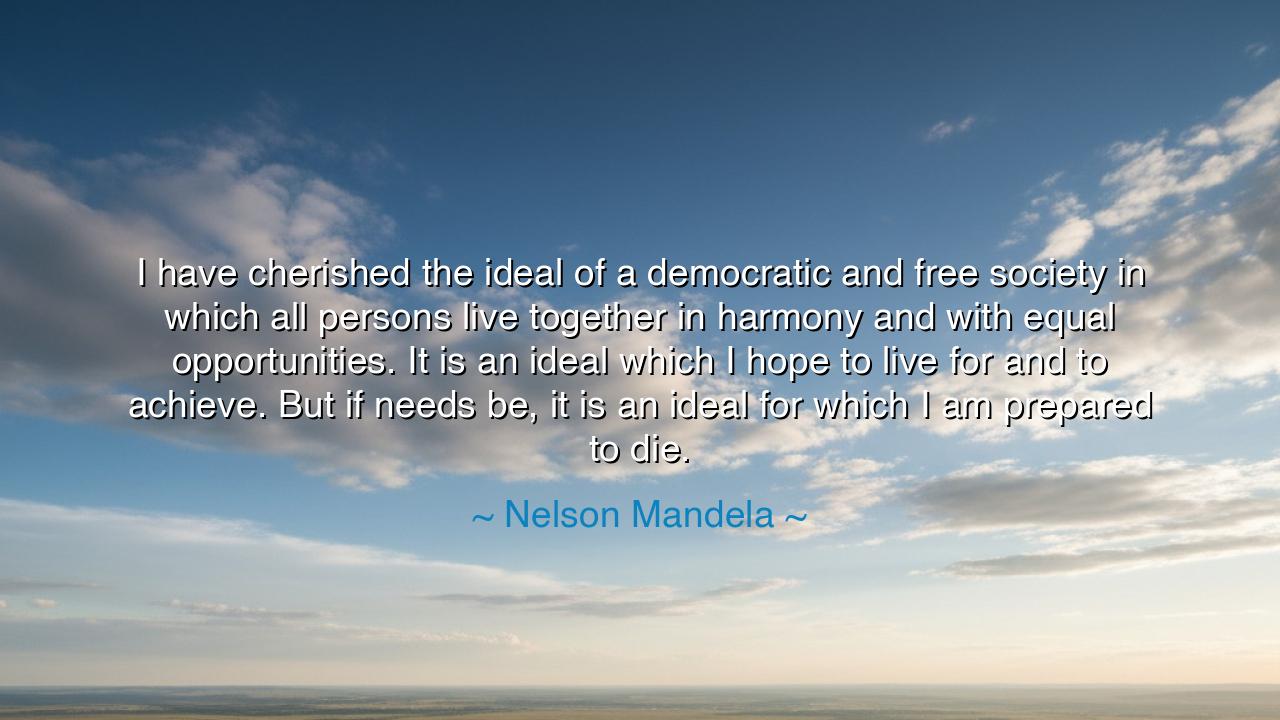
I have cherished the ideal of a democratic and free society in
I have cherished the ideal of a democratic and free society in which all persons live together in harmony and with equal opportunities. It is an ideal which I hope to live for and to achieve. But if needs be, it is an ideal for which I am prepared to die.






In the councils of the steadfast, hear Nelson Mandela swear a vow that sounds like bronze struck at dawn: “I have cherished the ideal of a democratic and free society in which all persons live together in harmony and with equal opportunities. It is an ideal which I hope to live for and to achieve. But if needs be, it is an ideal for which I am prepared to die.” These words are not ornament; they are oath. They set before us a standard higher than comfort and stronger than fear: a democratic and free society, where equality and harmony are not slogans but shared bread.
The meaning is flint-bright. First, Mandela binds personal destiny to public justice: the ideal is worthy of a lifetime—and, if required, a life. Second, he teaches the grammar of courage: hope is not passive wishing but patient work, and when tyranny resists, hope must become willingness to suffer for the truth. The sentence therefore yokes love (for a single, nonracial society) to resolve (to endure whatever the struggle demands). So his pledge refuses both hatred and surrender: no domination, white or black; no quietism either—only the long, disciplined labor of freedom.
As to the origin, this last paragraph crowns Mandela’s three-hour address from the dock at the Rivonia Trial in Pretoria on April 20, 1964—the speech remembered by its closing line, “I am prepared to die.” He delivered it not as a witness to be cross-examined, but as an accused who would put apartheid itself on trial. He traced the failure of peaceful petitions, explained the turn to carefully limited sabotage, and then lifted his eyes to speak of the ideal that governed him. The courtroom expected a plea for mercy; it received a creed.
History testifies to the force of that moment. Observers believed the state desired the gallows; Mandela spoke as one already free within, measuring his captors by the future he named. Though the sentence was life imprisonment, not death, the words opened a channel through which the world could see South Africa’s moral crisis. Sixty years on, the paragraph is still taught among the century’s great utterances—not for rhetoric alone, but because a nation eventually walked toward the ideal he confessed.
To make the teaching plain, recall a humbler story from a township night. A young organizer—books in a satchel, fear in the bones—read the paragraph before knocking on doors where informers might listen. “Prepared to die,” he whispered, not as bravado but as bracing truth: if elders could endure quarry dust and isolation on an island of stone, surely he could endure a slammed door and a long evening. He went on. In the months that followed, neighbors learned to hold meetings, to guard one another, to sign their names with courage. The paragraph became a lantern; ordinary people, its flame.
The lesson reaches us across borders and years. To “cherish the ideal” is to attach your life to a good that outlives you; to “hope to live for it” is to convert vision into daily discipline—study, coalition, lawful pressure; and to be “prepared to die” (if needs be) is to strip the tyrant of his last weapon, fear. This triad—ideal, work, sacrifice—is the ancient architecture of change. It keeps movements from curdling into vengeance and prevents patience from decaying into passivity.
Take therefore a rule for your own road. Name the ideal you will serve (write it in one sentence). Map the work you will do this month (three actions with dates). Set the costs you accept (time, reputation, safety measures) so fear cannot bargain you away from principle. Build broad fellowship that rejects domination of any kind and insists on equal opportunities for all. And when fatigue gathers, read again the closing cadence from Pretoria; let it tune your heart to the steady key of freedom: live for the ideal, labor for it—and if needs be, be brave for it.






AAdministratorAdministrator
Welcome, honored guests. Please leave a comment, we will respond soon